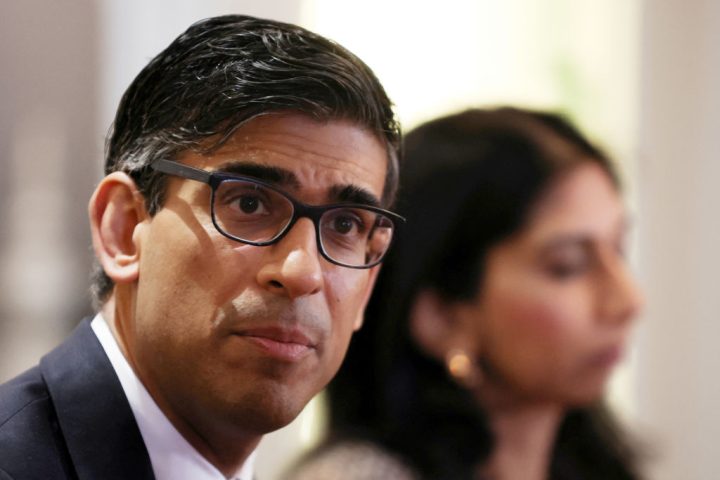Few observers of politics can by now be in much doubt about the defective nature of Keir Starmer’s antennae when it comes to picking up the concerns of the British public. The number of U-turns the Labour leader has made once it has been explained to him what most voters actually think – the latest being over trans issues – is quite striking.
But we should keep in mind that Rishi Sunak’s antennae are not especially reliable either. He is neither an early period Thatcher with an innate understanding of the instincts of ‘our people’, nor an early period Blair with a natural popular touch.
Sunak’s relaxed position could be interpreted as a sign that more mass inward migration will follow if he is returned to power
The Prime Minister has just reminded us of this weakness in an interview with the always astute Paul Goodman of the ConservativeHome website. Naturally, Goodman questioned him about his pledge to ‘stop the boats’, yielding an admission from the PM that it might still be a work in progress by the time of the next general election.
That acknowledgment led to a flurry of tricky tabloid headlines. But it was not the issue on which Sunak left himself wide open to a political right hook. Though it took him a while, he clearly gets the extent of public fury about illegal immigration via the English Channel and is right to claim that he is doing far more to address it than any past premier has done.
What should concern every Tory supporter is the position that Sunak set out when Goodman went on to grill him on the related issue of legal immigration. This is particularly pertinent with regard to the OBR’s new forecast that it is going to average 245,000 a year net for the foreseeable future.
While the Prime Minister did suggest that such a high level of immigration was not necessarily a pre-condition for future economic growth, citing the potential for further welfare reform, he did not shut down the OBR prediction. Instead, he suggested that public concerns over legal immigration centred largely on the issue of ‘control’ rather than volume and that this had been addressed by Brexit. ‘Fundamentally, the decisions about who is coming here and what they are doing here…we are now in control of,’ he said.
Sunak then added: ‘The most important question, the thing that everyone talks to me about, is not that. It’s the boats.’
No doubt that is a comforting delusion to be under for the leader of a party which failed to fulfil a promise to reduce net immigration below 100,000 for ten years in a row before Boris Johnson dropped the pledge. Or for a leader whose party presided over immigration to the UK of an unprecedented one million people last year (half a million net). But it is a delusion, nonetheless.
The UK population has grown by more than nine million in the past quarter of a century, the great majority of that being due to high net immigration. The vast influx has put public services, housing, infrastructure, wages for working class jobs and community cohesion under great pressure. And for millions of socially conservative voters the proposed volume of future immigration is therefore at least as important as the theoretical ‘control’ UK governments now possess over it. A lot of opinion research actually points towards this concern being even greater among the working class former Labour voters who switched to the Tories in 2019 than it is among traditional Conservatives, though it is high among them too.
Tory prime ministers since David Cameron have failed to make good on promises to reduce immigration volumes. With this in mind, the average voter will surely interpret Sunak’s relaxed position on the issue as a sign that more mass inward migration will follow if he is returned to power at next year’s election. And they’d be right to do so.
That leaves a significant gap in the market for a party willing to commit to ending mass immigration and to switch to something far more socially sustainable. This is where Richard Tice and his Reform party may be about to make a significant intervention.
In recent weeks the Reform leader has been investigating the potential of a policy of ‘Net Zero Immigration’. This would involve moving to what Frank Field and Nick Soames referred to as ‘balanced migration’ when they launched a campaign for it in the 1990s. That is to say, the number of incomers would be pegged to the number of outgoers over a fixed period such as a four- or five-year parliamentary term. It would still allow for approximately 400,000 immigrants a year as that equates to the level at which annual emigration has recently settled. But it would also address concerns about immigration pushing up the UK population to unsustainable levels with all the deleterious effects that has involved.
As one source close to Reform puts it: ‘Nobody can say it is a North Korean option whereby the UK would simply pull up the drawbridge against foreigners. But equally it deploys the concept of sustainability that the Left have exploited when it comes to environmentalism. And it’s got the word zero in it.’
Tice is making a set piece speech at a Reform party gathering in Derby this weekend. If he nails his colours to the mast of Net Zero Immigration then Sunak is going to find himself badly gazumped in the contest for the affections of migration-sceptic voters.







Comments